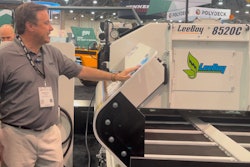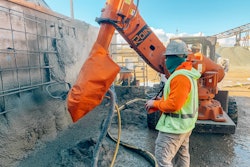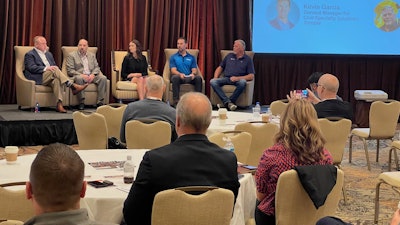
On the final day of the IGNITE 2022 Construction Summit, that took place between December 7-10 at the Sandpearl Resort in Clearwater, Florida, the Association of Equipment Manufacturers (AEM) held a presentation and sponsored a panel with some leading experts in their respective fields: Brian Bieller, President & CEO Leeboy; Ray Gallant, Vice President Sales Support, Region Americas Volvo; Kevin Garcia, General Manager for Civil Specialty Solutions Trimble Inc.; and Tom Travers, Technical Sales Director, Road Building & Forestry Astec.
The panel was proceeded by a short presentation by AEM's Senior Director of Construction, Sara Feuling. She revealed an exclusive look at what association calls "The Future of Building". The report covered 10 industry trends that they believe will be major factors in the year 2023 for the construction industry as a whole, which, of course, includes the road building and paving world.
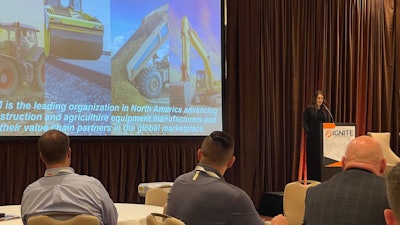 Sara Feuling sharing The Future of Building report.Brandon Noel
Sara Feuling sharing The Future of Building report.Brandon Noel
Even though the IGNITE Construction Summit directed a large amount of its attention and efforts to the needs and interests of small business owners and pavement maintenance professionals, there were a number of opportunities for the larger scale asphalt industry pros to learn things and gain valuable insight. In fact, AEM's segment on Saturday morning provided perhaps the deepest dive into that sector. Not only that, but it also acted as a sort of summarization of many of the main topics and popular interests of the entire weekend.
The 10 industry trends were broken down into 3 larger categories:
- Environmentally Friendly Transformations
- Technology Transformations of the Industry
- Transformations of the Business
Of the first category, the panel went in-depth into the reality of carbon based fuels, and the increased regulation that is spurring the adoption of many alternative power solutions. BAUMA was a recent significant example cited by one of the panelists, Brian Bieller, when he talked about the sheer number of companies showing off their electric, hydrogen, and other cutting edge machines like compact machines that reduce other forms of pollution, as well.
Renewable energy for construction companies nearly derailed the overall conversation, taking up a considerable amount of time. Ray Gallant did his best to try and assuage attendees vocal objections and concerns about being forced into a paradigm they didn't ask for. While it did get somewhat heated, the general agreement amongst, not just this panel but others during the week, was that these changes and the demands of large scale clientele will eventually require the industry to shift. Better to be ahead of the curve.
In the second category, while the promise of ever more autonomous machinery was brought up, and framed as the inevitable end-goal, most likely. The real star, however, was "data". No, not the beloved android character from Star Trek, but, rather, then increasing amount of available information that can be gathered, sorted, and evaluated to the benefit of its owner. Kevin Garcia discussed in detail how important, and lucrative data will be. Rich sets of real time diagnostics and tracking, and the technology/sensors that will make the data more accessible to us.
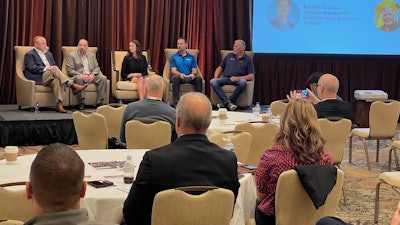 A panel about the 2023 industry trends moderated by AEM's Sara Feuling, Senior Director of Construction.Brandon Noel
A panel about the 2023 industry trends moderated by AEM's Sara Feuling, Senior Director of Construction.Brandon Noel
In the last, and largest, category--housing the final 4 individual trends--the transformation of business covered some of the most prevalent plot lines from this past year, as well. It was said that 41% of the construction workforce will retire by 2031, and that there are simply more people leaving the industry that there are coming into it. It's going to not only change the makeup of our labor groups, but, also, the nature of their skillsets.
Tied to all that new, compact, sustainable, and alternative machinery are expensive price tags. An audience member brought up their costs versus how long before they become obsolete, giving the turnover of cell phone tech as an example. A valuable question. indeed. Feuling replied that they expect a shift away from capital expenditures, towards subscription based programs. This is also applies to the way that the construction/maintenance industries might also adapt into non-traditional models of business too, but didn't give specifics.
Again, digital data reared its head and, along with it, cyber security. Spending on security has increased 188% between 2018-2019, and has likely only increased more since the pandemic. With all these new pools of contraction data, the real value of its collection will emerge. It has inherent value, and businesses may find creative ways to profit from the data itself.
The general sense was a large agreement about the rapid changes coming to the industry, but there was a lack of consensus on exactly what would happen and when. The full report from AEM can be downloaded and reviewed in detail on their website.






